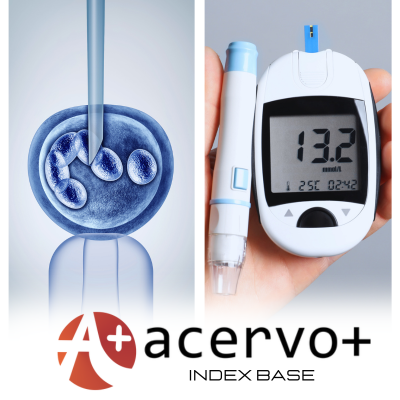Terapia genética no tratamento do diabetes mellitus tipo 1
##plugins.themes.bootstrap3.article.main##
Resumo
Objetivo: Reconhecer modelos, aplicações e genes alvos da terapia gênica no manejo do Diabetes Mellitus Tipo 1 (DM1). Métodos: Revisão integrativa de literatura, feita por meio das bases de dados Pubmed e Medline, através da Biblioteca Virtual em Saúde (BVS). Foram utilizados descritores relacionados ao Diabetes Mellitus Tipo 1, à Terapia Genética e às Células Beta Pancreáticas, além dos operadores booleanos: AND e/ou OR. Identificaram-se 1080 artigos, dos quais 17 foram selecionados para a análise conclusiva, de acordo com os critérios de elegibilidade. Resultados: Destaca-se uma ampla variedade de abordagens terapêuticas para o tratamento do Diabetes do Tipo 1 por meio da Terapia de Genes. Estas incluem intervenções em proteínas ligadas à etiopatologia do DM1, uso de vetores virais, manipulação de fatores de transcrição em células beta pancreáticas, modulação imunológica e gerenciamento da transdiferenciação celular para alcance da normoglicemia. Considerações finais: A aplicação da terapia gênica no DM1 mostra promissoras perspectivas de intervenção, possibilitando a reversão da condição e melhor controle dos níveis glicêmicos. Entretanto, há ainda limitações quanto aos efeitos a longo prazo e à necessidade de maior apoio financeiro para as pesquisas em seres humanos.
##plugins.themes.bootstrap3.article.details##
Copyright © | Todos os direitos reservados.
A revista detém os direitos autorais exclusivos de publicação deste artigo nos termos da lei 9610/98.
Reprodução parcial
É livre o uso de partes do texto, figuras e questionário do artigo, sendo obrigatória a citação dos autores e revista.
Reprodução total
É expressamente proibida, devendo ser autorizada pela revista.
Referências
2. BATHINA S, DAS UN. Resolvin D1 Decreases Severity of Streptozotocin-Induced Type 1 Diabetes Mellitus by Enhancing BDNF Levels, Reducing Oxidative Stress, and Suppressing Inflammation. Int J Mol Sci, 2021; 22(4): 1516.
3. BRACHÈNE AC, et al. Preclinical evaluation of tyrosine kinase 2 inhibitors for human beta-cell protection in type 1 diabetes. Diabetes Obes Metab, 2020; 22(10): 1827-1836.
4. CELIS MF, et al. PAHSAs reduce cellular senescence and protect pancreatic beta cells from metabolic stress through regulation of Mdm2/p53. Proc Natl Acad Sci U S A. 2022; 119(47): 2206923119.
5. CHING WL, et al. Behavioural and Emotional Problems in Malaysian Children and Adolescents with Type 1 Diabetes Mellitus: A Cross-sectional Study in a Single Centre. J ASEAN Fed Endocr Soc, 2023; 38(2): 13-19.
6. EIZIRIK DL, et al. From Pancreatic β-Cell Gene Networks to Novel Therapies for Type 1 Diabetes. Diabetes, 2021; 70(9): 1915-1925.
7. ERENDOR F, et al. Lentivirus Mediated Pancreatic Beta-Cell-Specific Insulin Gene Therapy for STZ-Induced Diabetes. Mol Ther, 2021; 29(1): 149-161.
8. GARDNER D, et al. Relationship between CGM-derived nocturnal hypoglycemia and subjective sleep quality in people with type 1 diabetes. Sci Rep, 2023; 13(1): 20887.
9. GRAVES LP, et al. Improved Baculovirus Vectors for Transduction and Gene Expression in Human Pancreatic Islet Cells. Viruses, 2018; 10(10): 574.
10. ITOH A, et al. Soluble CD137 Ameliorates Acute Type 1 Diabetes by Inducing T Cell Anergy. Front Immunol, 2019; 10: 2566.
11. MAHONEY ALG, et al. Pancreatic Transdifferentiation Using β-Cell Transcription Factors for Type 1 Diabetes Treatment. Cells, 2022; 11(14): 2145.
12. OH E, et al. Syntaxin 4 Enrichment in β-Cells Prevents Conversion to Autoimmune Diabetes in Non-Obese Diabetic (NOD) Mice. Diabetes, 2021; 70(12): 2837-2849.
13. OLIVEIRA BA, et al. Vetores virais para uso em terapia gênica. Rev Pan-Amaz Saude, 2018; 9(2): 2176-6223.
14. PARAJULI KR, et al. Pax4 Gene Delivery Improves Islet Transplantation Efficacy by Promoting β Cell Survival and α-to-β Cell Transdifferentiation. Cell Transplant. 2020; 29: 963689720958655.
15. PILSNIAK A e OTTO-BUCZKOWSKA E. Type 1 diabetes - What's new in prevention and therapeutic strategies? Pediatr Endocrinol Diabetes Metab., 2023; 29(3): 196-201.
16. RUSSO F, et al. InsB9-23 Gene Transfer to Hepatocyte-Based Combined Therapy Abrogates Recurrence of Type 1 Diabetes After Islet Transplantation. Diabetes, 2021; 70(1): 171-181.
17. SCHUSTER C, et al. Peripherally induced regulatory T cells contribute to the control of autoimmune diabetes in the NOD mouse model. Eur J Immunol, 2018; 48(7): 1211-1216.
18. SKOVSø S, et al. ß-Cell Cre Expression and Reduced Ins1 Gene Dosage Protect Mice From Type 1 Diabetes. Endocrinology, 2022; 163(11): 1945-7170.
19. WANG P, et al. miR-216a-targeting theranostic nanoparticles promote proliferation of insulin-secreting cells in type 1 diabetes animal model. Sci Rep, 2020; 10(1): 5302.
20. WANG Y, et al. Long-Term Correction of Diabetes in Mice by In Vivo Reprogramming of Pancreatic Ducts. Mol Ther, 2018; 26(5): 1327-1342.
21. XIAO X, et al. Endogenous Reprogramming of Alpha Cells into Beta Cells, Induced by Viral Gene Therapy, Reverses Autoimmune Diabetes. Cell Stem Cell, 2018; 22(1): 78-904.
22. XIE L, et al. Glucose-Activated Switch Regulating Insulin Analog Secretion Enables Long-term Precise Glucose Control in Mice With Type 1 Diabetes. Diabetes, 2023; 72(6): 703-714.

